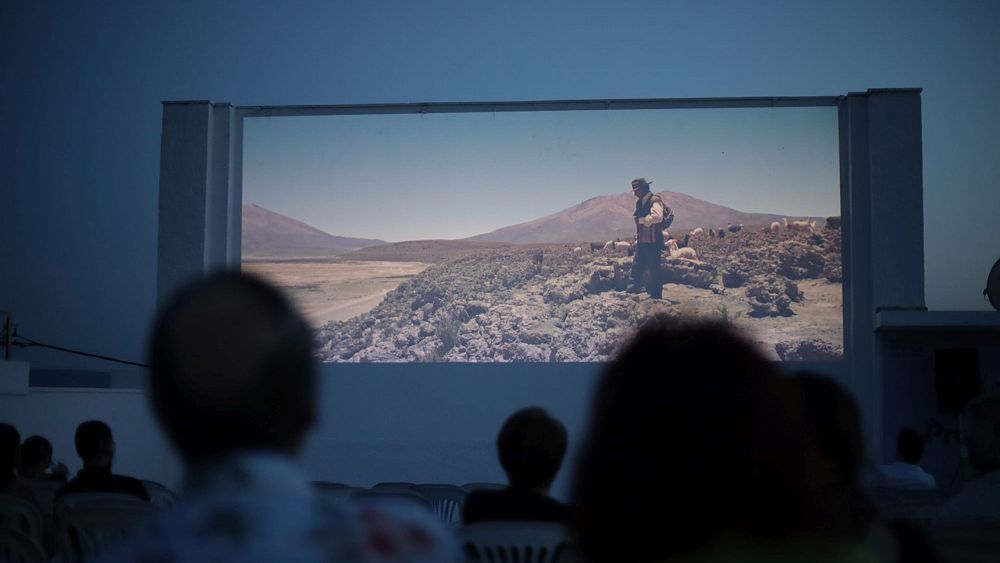
After suffering a devastating forest fire last year, the Greek island of Evia is looking to transform itself into Europe’s most environmentally friendly destination for filmmakers. We visited the island to meet the people planning its revival.
Healing after a disaster can take many forms: all-important aid packages, reforestation, infrastructure works and perhaps… a film festival?
To describe the Evia Film Project as simply a film festival would be to do it a disservice. In its second edition, the festival-come-ecological initiative is an offshoot of the Thessaloniki International Film Festival, the most prominent film festival in Greece.
What started out as “offering support to a stricken area,” Elise Jalladeau, Director General of the Thessaloniki International Film Festival, tells Euronews, has become something bigger.
Evia Film Project “aims to interweave the art of cinema with environmental awareness, while promoting a series of actions that boost local society,” she says.
Between 20 – 24 June, film fans, filmmakers, location managers and screenwriters descended on the towns of Aidipsos, Limni and Agia Anna in northern Evia for open-air screenings, concerts, and workshops, all dedicated to “green cinema,” environmental education and the revitalisation of Greece’s second-largest island.
“I love that this event is profoundly intertwined with the local community and geography – hence such a unique opportunity to connect with a truly magical part of Greece, often off the tourist radar,” said Chiara Liberti, Artistic Director of Bologna’s Biografilm Festival, renowned for championing both documentary and fiction films about life stories, on visiting Evia.
Big names in attendance included twice Oscar-winning film director Alexander Payne, who kicked off the festival with a screening of his 2017 film Downsizing at the recently reopened Apollon open-air cinema. While Downsizing presents a comedic take on a discovery hailed as a possible answer to the climate crisis, the more dystopian yet moving animated eco-fantasy White Plastic Sky (Tibor Bánóczki & Sarolta Szabó, 2023) transports viewers to a post-apocalyptic Budapest to reflect on the lines and links between environmentalism and oppression.
Though lasting a mere 21 minutes, a screening highlight was undoubtedly young local filmmaker Dimitris Trompoukis’s documentary Roots, which follows residents of Northern Evia as they explore a way forward for their island — their love for which is palpable — and was made to complement and inform a town planning initiative.
“The documentation of the place through the eyes of its locals was attempted in order to better understand — as planners — the lived and conceived space of the area,” says Trompoukis, “Filmmaking can be a very powerful means […] as an alternative and comprehensive means of public consultation.”
Watching films is only part of Evia Film Project, however – making them is just as important.
“Evia Film Project is adopting a holistic approach that encompasses cinema and ecology,” says Jalladeau, “Having its eyes set on bringing forth a new way of making cinema, as well as a fresh take on the notion of development, both artistic and social.”
As a long-term aim, the project seeks to establish Evia as a global hub for eco-conscious cinema, both for showcasing films and for their production. As such, a big focus of the event was shining a light on the landscapes of northern Evia as potential filming locations, with location managers introduced to the thermal pools of Edipsos — which have been welcoming travellers in search of healing for over 3,000 years — dramatic Lake Papastratis, idyllic Lichadonisia island chain and striking Vasilina lighthouse, among others.
In case location managers were in need of any inspiration, producer Danae Spathara was on hand to lead a masterclass in shooting on Evia — delving into her experiences filming part of Oscar-nominated black comedy Triangle of Sadness, which took home the Palme d’Or at Cannes in 2022.
In Jalladeau’s eyes, the future is bright for Evia Film Project and the island in which it is so embedded. “The fact that Evia Film Project consolidated its place both in the local community and in the summer film festival line-up is already a sign of its success, outreach and potential,” she told us.
What’s next? “More advanced masterclasses and workshops, distinguished renowned guests and a richer selection of film screenings,” she says, along with a series of “ground-breaking initiatives” that will draw even more filmmakers to Evia to shoot their masterpieces.
But why stop at Evia? “Evia Film Project is undoubtedly a very important event not only for the area in which it is taking place […] This event could be the paradigm for the organisation of more decentralised cultural events, sponsored by the local and central governments, being able to reinforce and rejuvenate the Greek countryside,” Trompoukis reflects.